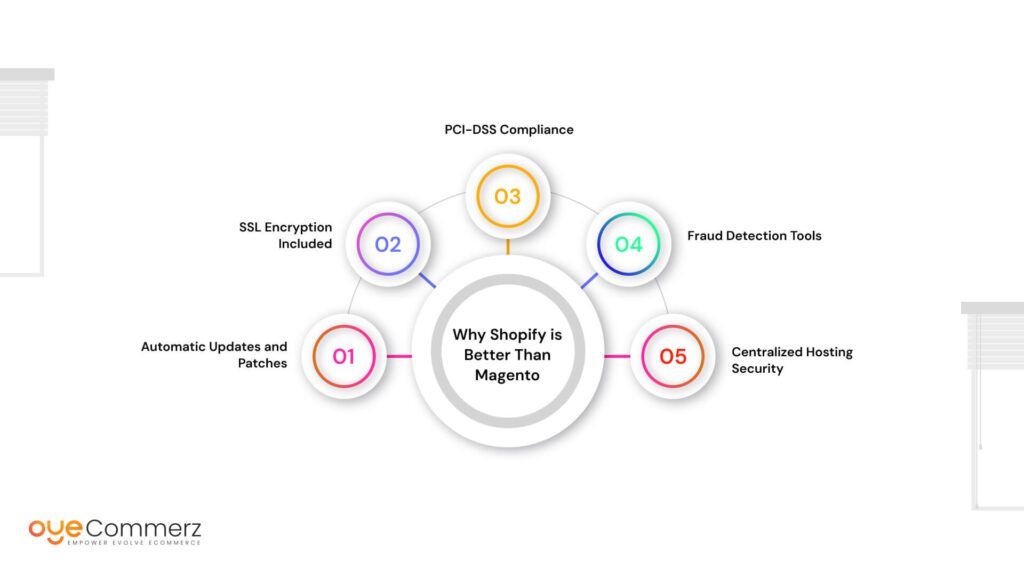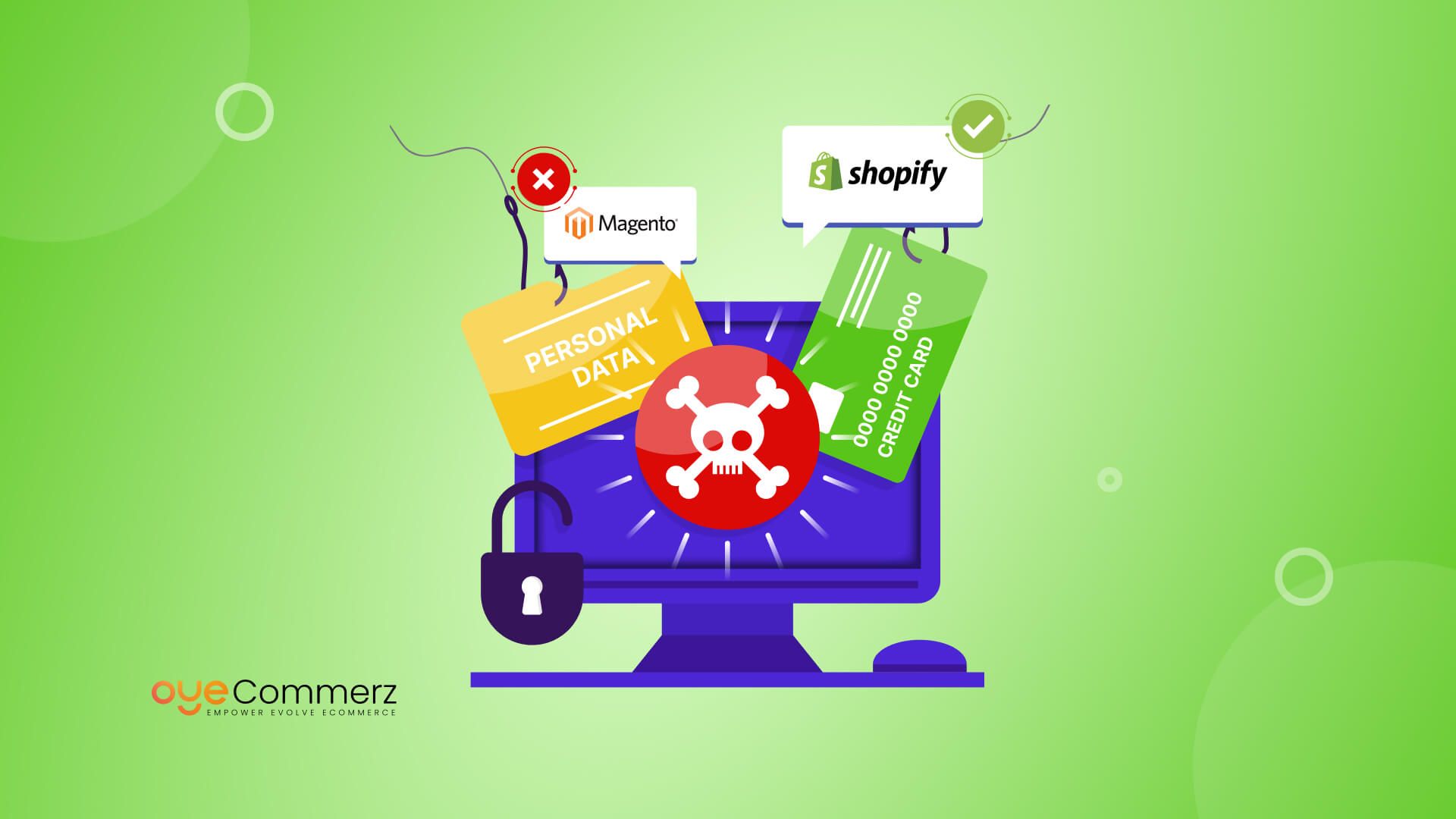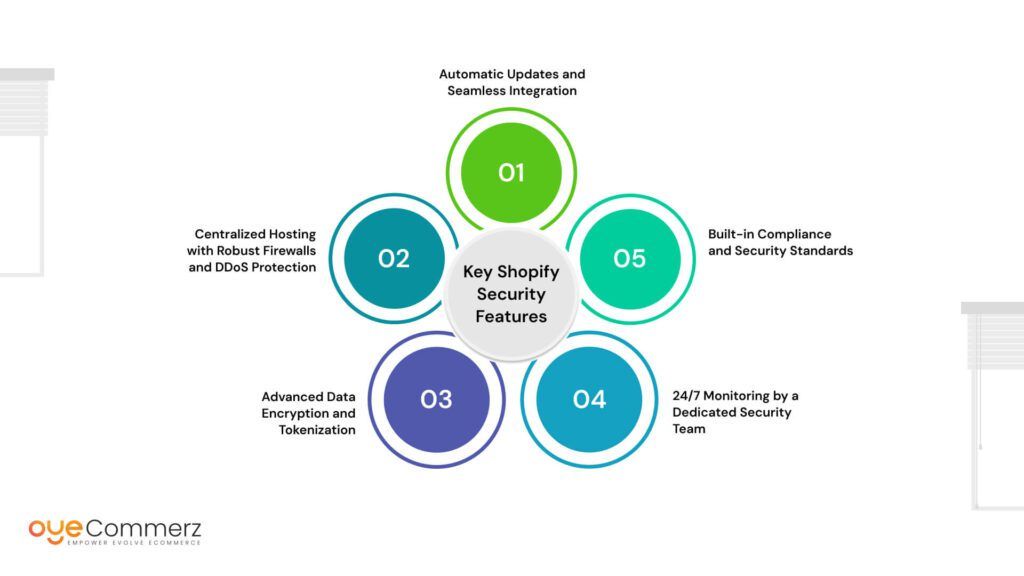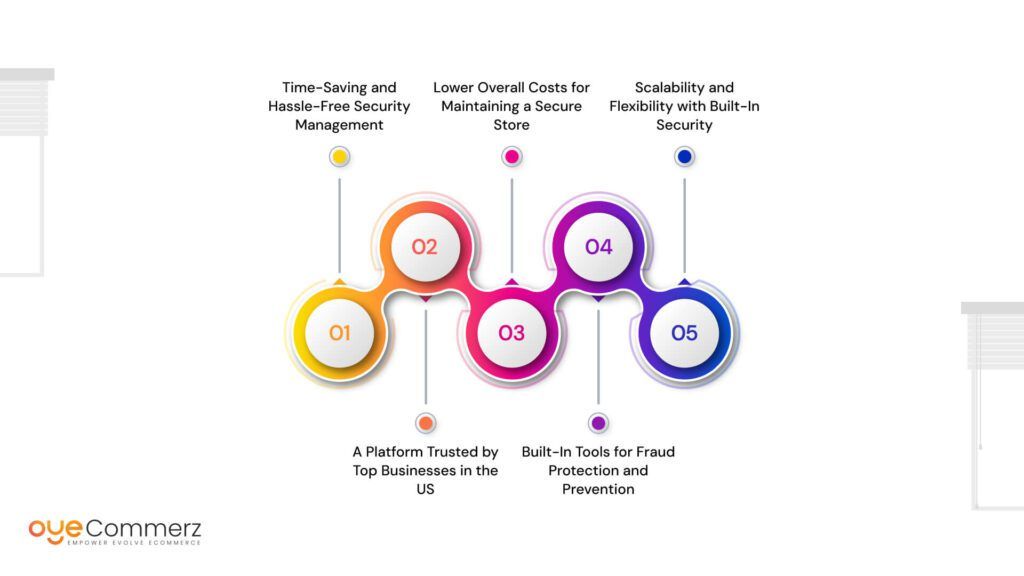Worried about the security of your online store? Data breaches cost businesses an average of $4.45 million in 2023. For existing business owners like you, every customer’s trust is priceless, and your choice of platform plays a huge role in keeping that trust intact. If your Magento store feels more like a liability than an asset, it might be time to move to Shopify. With its airtight security features and proactive protection, Shopify takes the stress out of safeguarding your store. In this blog, we’ll dive into why Shopify is better than Magento, giving you a safer option and how making the switch could save your business from costly security risks. Let’s secure your future together!
Table of Contents
ToggleThe Rising Threat of Data Breaches in eCommerce Stores
Running an eCommerce store means handling sensitive customer data like names, addresses, and payment details. This makes online stores attractive targets for hackers. Cybercriminals see this information as valuable because they can use it for fraud or sell it on the dark web.
Why Are eCommerce Stores Prime Targets for Hackers?
Hackers often target online stores because they’re easier to access than large corporate systems. Many eCommerce sites rely on outdated software, weak passwords, or unsecured extensions, giving cybercriminals an easy way in.
Common Security Challenges Faced by Business Owners
- Outdated Software: Many platforms require regular updates, but these can be hard to keep up with, leaving security gaps.
- Third-Party Plugins: Extensions and add-ons often have vulnerabilities that hackers can exploit.
- Human Error: Employees may unknowingly click on phishing links or use weak passwords, making it easier for attackers to gain access.
The Risks of Losing Customer Trust and Business Reputation
A single breach can do serious damage to your business. Customers lose trust if their data is stolen, and it’s hard to win that trust back. Plus, news of a breach can hurt your brand’s reputation, leading to lost sales and expensive fines. For eCommerce businesses, security isn’t just a technical issue it’s the foundation of customer loyalty and business growth.
Magento’s Security Challenges
Magento is a popular platform for eCommerce, but its open-source nature comes with some serious security risks. Open-source means the code is publicly available, which is great for flexibility and customization but it also makes it easier for hackers to find weaknesses.
Key Vulnerabilities of Magento
1. Manual Updates and Security Patches
Magento requires frequent manual updates to fix security issues. Missing these updates can leave your store open to attacks, and staying current demands time, effort, and technical expertise.
2. Third-Party Extensions with Flaws
Magento often relies on third-party plugins for added functionality. However, these plugins can contain vulnerabilities, and if not regularly checked or updated, they become easy entry points for hackers.
3. Server Security is Your Responsibility
Magento store owners must handle their own hosting and server security, including firewalls, malware protection, and backups. Without expert management, these critical areas can become weak points.
4. Open-Source Code Accessibility
While Magento’s open-source nature offers flexibility, it also means hackers can study the publicly available code to identify and exploit weaknesses in unpatched systems.
5. Susceptibility to Brute Force and DDoS Attacks
Without robust built-in protections, Magento stores are more vulnerable to brute force attacks (guessing passwords) and DDoS attacks (overloading servers), which can disrupt your store or compromise sensitive data.
Why Shopify is Better Than Magento Solving Security Problems?

1. Automatic Updates and Patches
One of the biggest challenges with platforms like Magento is the need for regular manual updates and security patches. Shopify handles all of this for you automatically, ensuring your store is always using the latest version with the most up-to-date security fixes. This eliminates the risk of vulnerabilities due to outdated software and saves you time and effort in managing updates yourself.
2. SSL Encryption Included
Every Shopify store comes with built-in SSL (Secure Socket Layer) encryption, which secures the connection between your store and your customers. This means that sensitive data, such as payment information, is encrypted and kept safe from hackers during the transaction process. Additionally, having SSL encryption makes your site look more trustworthy to customers, as they’ll see the secure padlock icon in their browser’s address bar, boosting confidence in your store.
3. PCI-DSS Compliance
Payment Card Industry Data Security Standard (PCI-DSS) compliance is a set of security standards required for businesses that handle credit card transactions. Shopify takes care of this for you, ensuring your store automatically meets these stringent security requirements. This includes secure handling of cardholder data, regular system scans, and maintaining firewalls key measures that would be time-consuming and complex for a store owner to manage on their own.
4. Fraud Detection Tools
Shopify goes beyond just providing security; it actively helps protect your business from fraud. The platform includes advanced fraud detection tools that analyze every transaction for suspicious activity. If a purchase looks potentially fraudulent, Shopify will flag it for you and even provide a risk score, helping you make informed decisions before shipping orders. This proactive approach helps you prevent chargebacks and protects your revenue.
5. Centralized Hosting Security
Shopify’s hosting is fully managed and centralized, meaning it’s designed with top-tier security protocols in place. Shopify handles server security, including protection from DDoS (Distributed Denial of Service) attacks, which can overwhelm a server and take your store offline. This means you don’t have to worry about finding and maintaining your own hosting services or dealing with the security risks associated with self-hosted platforms. Shopify’s servers are built to withstand high traffic and prevent downtime, ensuring your store remains secure and operational at all times.
With these built-in features, Shopify provides a level of security that most business owners would struggle to achieve on their own, allowing you to focus on growing your business while knowing your data and customers are safe.
Key Shopify Security Features that Outshine Magento
1. Automatic Updates and Seamless Integration
Shopify takes the hassle out of security management by automatically handling all updates and security patches. Unlike Magento, which often requires manual updates, Shopify ensures that your store is always using the latest version of the platform, with the most up-to-date security fixes. This eliminates the risk of running outdated software, reducing the chance of security vulnerabilities and saving you valuable time. You won’t need to worry about integrating updates either; Shopify handles it all seamlessly, so your store stays secure without any extra effort from you.
2. Centralized Hosting with Robust Firewalls and DDoS Protection
Shopify provides fully managed hosting, which includes server security as part of its platform. This means that you don’t have to worry about managing servers or security settings on your own. Shopify uses powerful firewalls to block unauthorized access and includes built-in DDoS (Distributed Denial of Service) protection to guard against cyberattacks that could overload and crash your site. This ensures that your store is always up and running, even during high traffic or times of increased attack attempts, which could be a challenge for self-hosted platforms like Magento.
3. Advanced Data Encryption and Tokenization
Shopify takes customer data protection seriously with advanced encryption protocols. Every transaction made on your store is encrypted, meaning even if someone intercepts the data, it remains unreadable. In addition, Shopify uses tokenization, which replaces sensitive payment information with a unique token. This means actual credit card details are never stored or processed directly, adding an extra layer of security that makes it incredibly difficult for hackers to steal sensitive data.
4. 24/7 Monitoring by a Dedicated Security Team
Shopify provides round-the-clock monitoring of your store’s security. Their dedicated security team is always watching for any suspicious activity, ensuring that potential threats are detected and addressed before they can cause harm. Whether it’s an attempt to breach your store or signs of unusual activity, Shopify’s team acts quickly to mitigate risks, providing constant vigilance and peace of mind. This level of monitoring is especially beneficial for business owners who don’t have the resources to monitor their store’s security manually.
5. Built-in Compliance and Security Standards
Shopify is fully compliant with various global security standards, including PCI-DSS (Payment Card Industry Data Security Standard). This means that Shopify’s platform is designed to meet strict requirements for processing credit card transactions, providing a secure environment for both you and your customers. As part of its built-in compliance, Shopify manages the necessary certifications and updates, saving you the time and effort of maintaining compliance yourself, which is often a complex and ongoing task with platforms like Magento.
These features show why Shopify’s approach to security outshines Magento. With built-in tools and expert-level protection, Shopify makes it easier for business owners to run secure stores, freeing them up to focus on growth without worrying about vulnerabilities.
Why Moving to Shopify Makes Sense for Business Owners?
1. Time Saving and Hassle-Free Security Management
One of the biggest challenges with platforms like Magento is managing security yourself. You’re responsible for regular updates, applying patches, and ensuring your website’s security measures are always up-to-date. With Shopify, all of this is handled for you. Shopify automatically updates the platform, including security patches, so you don’t have to worry about vulnerabilities or spend time on technical maintenance. This saves you a lot of time and effort, allowing you to focus on other important aspects of your business, like sales and marketing, without constantly stressing about security issues.
2. A Platform Trusted by Top Businesses in the US
Shopify is trusted by thousands of businesses across the United States, ranging from small startups to large, well-known brands. Many top U.S.-based companies use Shopify because of its robust security features and the reliability it offers. This trust is built on years of excellent service and a reputation for keeping businesses and customer data safe. When you move to Shopify, you join a community of businesses that rely on a secure, professional platform that scales with their growth.
3. Lower Overall Costs for Maintaining a Secure Store
While Magento might seem like a lower-cost option, the reality is that the ongoing cost of maintaining a secure store can add up quickly. You need to invest in server security, hire experts to monitor your store, and manage updates. Shopify, on the other hand, bundles all of this security into its monthly plan, which means no hidden costs for security measures or technical staff. Shopify provides a secure, fully managed environment for a fixed cost, saving you both money and the stress of managing it all yourself.
4. Built-In Tools for Fraud Protection and Prevention
Shopify offers a variety of tools to detect and prevent fraudulent transactions. With built-in fraud analysis and monitoring, Shopify scans each order for signs of suspicious activity, like mismatched billing and shipping addresses, and provides you with a risk score. This allows you to make informed decisions before fulfilling orders. These tools protect your revenue from chargebacks and unauthorized transactions, reducing the financial strain and reputation damage that fraud can cause.
5. Scalability and Flexibility with Built-In Security
As your business grows, security becomes even more critical. Shopify scales with your business and continues to offer top-notch security features as you expand. Whether you’re adding new products, integrating third-party apps, or increasing sales, Shopify’s secure infrastructure is designed to handle higher volumes of traffic and transactions without compromising on safety. This scalability means you won’t need to worry about constantly upgrading your security or dealing with a platform that can’t keep up as your business grows.
Moving to Shopify simplifies your eCommerce journey by offering a secure, trusted, and cost-effective platform that lets you focus on what matters most growing your business.
Steps to Move to Shopify Without Downtime
1. Evaluate Your Current Store’s Data and Extensions
Start by reviewing your current store’s data, including products, customer information, and order history. Identify any extensions or apps you’re using, as some may not be available on Shopify. This will help you plan what needs to be transferred and which features you’ll need to recreate on Shopify.
2. Backup Your Data
Before moving anything, ensure you create a backup of your current store’s data. This includes all important customer and product details, as well as any customizations you’ve made. Having a backup will protect you in case anything goes wrong during the migration process.
3. Partner with Shopify Experts for Smooth Migration
To ensure a seamless transition, work with Shopify experts or migration professionals like Oyecommerz who specialize in moving stores. They can handle the technical details, transfer your data securely, and minimize the risk of errors, so your business won’t experience unnecessary downtime.
4. Test Your New Shopify Store Before Going Live
After migrating, thoroughly test your new Shopify store. Check that all data has transferred correctly, product listings are accurate, and all payment gateways work smoothly. Testing before going live will help catch any issues early and avoid problems once your store is up and running.
5. Optimize Your Store for Performance and Security
Once your store is live, optimize it for speed by compressing images and eliminating unnecessary apps. Make sure your store is secure by enabling SSL encryption and using Shopify’s built-in fraud detection tools. This ensures your store is both fast and protected for a better customer experience.
By following these five steps, you can migrate to Shopify with minimal downtime and a smooth transition for your business.
Ready to Protect Your Store?
Make the switch to Shopify with Oyecommerz and secure your business from threats. Our expert team will handle your migration smoothly and efficiently, so you can focus on growing your brand. Start today and take control of your store’s security!
Contact to Migrate your Site to Shopify Now
Conclusion
Shopify offers a secure, reliable environment that takes the complexity of security management off your plate. With automatic updates, built-in encryption, fraud detection tools, and expert-level monitoring, Shopify ensures that your store and customer data are always protected. This allows business owners to focus on what truly matters growing their business without the constant worry of security threats or technical challenges.





